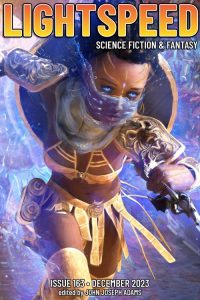Charles Payseur Reviews Short Fiction: GigaNotoSaurus, Diabolical Plots, Lightspeed and Rosalind’s Siblings
 GigaNotoSaurus 12/23
GigaNotoSaurus 12/23
Diabolical Plots 12/23
Lightspeed 12/23, 1/24
Rosalind’s Siblings, Bogi Takács, ed. (Atthis Arts) September 2023
The December GigaNotoSaurus mixes two of my favorite things in Sara Norja’s “Reconciliation Dumplings and Other Recipes”: Sspeculative fiction and food! The piece is framed as parts of a book of family recipes collated and annotated by Ember, who is writing them down to save them for future generations. More than merely documenting the past and its tasty treasures, though, Ember is also trying to do a bit of historical sleuthing, investigating when things between humans and the so-called demons of the lake had gotten so bad that Ember’s family has had to invent ways of hiding food for winter, when the demons are trapped beneath the ice and cannot claim their tithe of the best and most delicious foods. Like a good recipe, the story combines its ingredients well, and Norja serves it up with style, revealing a complicated past and savoring the flavor of hope that even long-strained relationships can be healed, and that food can help to both soothe old hurts and bring people together in peace and harmony.
Diabolical Plots closes out 2023 with “It Clings” by Hammond Diehl, which centers a dybbuk, a shiva, and a group of people remembering Louie, who recently passed and who might be the aforementioned dybbuk, though that doesn’t stop people from stabbing him with a pickle fork and tossing him into the back garden. Under the humor of the piece, though, there is a lingering touch of sadness and grief, and a recognition that people react differently to loss. Some are quick to move on, while for others, well, it clings, and though it hurts, that doesn’t mean that everyone needs to shake it off quickly. Diehl does a great job leaving a lot unsaid but still deeply felt.
The December Lightspeed features “We’ll Never Die in the Woods”, a new story from Carlie St. George in which two sisters with very different stories slowly find that their narratives tie together in unexpected but powerful ways. Retelling and subverting the fairy tale “Diamonds and Toads,” one of the sisters was rewarded for her kindness as a child with gems that fall from her mouth when she speaks, while the other was punished for perceived rudeness with snakes instead. What the two sisters learn when they meet much later, though, is that both of them have been victims – both have been betrayed and hurt – and that together they might be able to leverage their story into a happier direction. It’s a grim, lively, and layered take on a classic tale – something that St. George proves once again she is very talented at. Izzy Wasserstein also has a new story in the issue with “To the Waters and the Wild”, which also reimagines an older story, in this case The Odyssey and more specifically the scene with the sirens. Wasserstein shifts focus away from Odysseus lashed to the ship so he can listen to the siren song, and instead looks more closely at the sirens themselves – at their song, their expression, and their freedom. It imagines a sailor on Odysseus’s ship not interested in hearing the forbidden so much as hearing something unexpected that cuts through all the defenses, rationalizations, and fears that keep them bound to the societal expectations that keep them alone and at odds with their body and their self. The piece finds in the sirens’ song not a lure per se, but rather a pure expression that might resonate with some who thought such possibility and acceptance impossible. It’s a wild, passionate, and fantastic read.
Moving to Lightspeed’s January issue and my first reading of 2024, Ben Peek has a complex and fascinating story in “Shadow Films”, which follows Alvin, a man who has worked most of his career as a shadow actor, a film extra whose work has hidden meaning revealed only when his handlers compile his appearances in special ways. On an Earth where extraterrestrial refugees are kept in terrible conditions in the hopes of dissuading other aliens from making the trip, Alvin hopes his work pushes back against the injustices he sees. When he’s pulled into the middle of an anti-alien conspiracy theory, however, he has to face that he really doesn’t know what he’s contributing to, and Peek makes great use of that uncertainty and fear. Complicity is a complex and difficult thing to approach, but that doesn’t stop the story from doing just that in some careful and strong ways. Closing out the issue, Thomas Ha’s “To Be a Happy Man” keeps things tense and atmospheric with a story about a man who finds out that his son has not avoided the family curse. Because each generation of his family seems to be followed by a creepy presence – a spindly man who haunts and scares but doesn’t seem to hurt unless provoked. And Ha brings readers through the ways the family deals with it, how the narrator views the conditions of happiness, which might require a certain avoidance and conscious ignorance about the deadly and terrible things that might lurk all around, that no one person seems capable of really doing anything about. As with Peek’s story, there is a sense of people having to confront the uncomfortable and seemingly insurmountable things around them, and how refusing to act can simply ensure that the same awful cycles repeat generation after generation.
I’ll close out with the anthology Rosalind’s Siblings edited by Bogi Takács, which features “fiction and poetry celebrating scientists of marginalized genders.” The works range widely along many axes, and Takács reveals in eir introduction that is no mistake – the different approaches to that central organizing idea of the anthology reflect the diversity of the sciences and those who practice them. From biology to physics, from Earth’s present to its future, from Venus to much more distant worlds – the works might seem to defy a single grouping, and yet to me none of them feel out of place. In Jennifer Lee Rossman’s “Blood and Iron”, the science is forensic cryptozoology, as autistic (and face-blind) Dr. Leah Marsh must confront a series of deaths of magical beings like unicorns and, most recently, a fairy. For Dr. Marsh, a driven professional, it’s not enough to just poke at the bodies in the lab, though – when conventional avenues close, she heads out into the field to find out what’s happening and why. Rossman captures a wonderful mixture of passion, curiosity, and fun with Dr. Marsh and the increasing number of people who are pulled into her orbit to help with the investigation, and the story is a delightful (if slightly grim because of the subject matter) mystery that’s resolved with style and charm.
The anthology also takes something of a risk putting two stories of trans astronauts stationed in the Venusian clouds right next to each other, but it’s a gamble that pays off, as both provide a nice one-two punch of discovery and romance. In Cameron Van Sant’s “LDR”, Louis is a trans man pretending to be stuck researching in Antarctica to cover the delays in communication as he dips his toes into online dating to pass time mired in the boring monotony of life with only a view of clouds. As the online thing becomes more serious, though, a sudden discovery on Venus has startling implications not only for humanity but also specifically for Louis’s love life. It’s a lovely story of fear and discovery with some nice twists and turns and a brilliant ending. And it pairs nicely with Tessa Fisher’s “Morning Star Blues”, in which Kelsey and Ashley are two trans astronauts picked for a months-long research assignment in Venus’s clouds in part because of NASA’s assumption that as trans women they’ll be less… libidinous. Following an attempted rape and self-defense killing on a mission, the space organizations are desperate to avoid any more negative press. This fills Kelsey with mixed emotions as she struggles with the guilt of being chosen over so many others, especially given her growing feelings for Ashley. I love the way the story explores that guilt without condemning the women for their feelings and, eventually, actions as they discover amidst their scientific discoveries that they can’t deny what they feel for each other any longer. I also appreciate how Fisher follows Kelsey and Ashley back from their mission, finding in their bravery something strong enough to stand up to bureaucratic fears and make some positive change. And while the anthology is also full of works exploring the dangers of science without consideration, without ethics, I think ultimately it embraces the possibilities science opens for humanity, at least when those whose perspectives and expertise have long been marginalized and excluded from scientific spaces are allowed full participation and recognition.
Recommended Stories:
“Challenges to Becoming a Pro Dragonracer in Apapa-Downtown”, Uchechukwu Nwaka (Escape Pod 11/23)
“A Robot, a Physicist, and a Monk Walk Into a Bar”, A.D. Sui (Fusion Fragment 11/23)
“Nextype”, Sam Kyung Yoo (Strange Horizons 11/23)
“Maladaptive Camouflage”, Ann LeBlanc (Strange Horizons 12/23)
“Allies”, Monica Gribouski (Hexagon 12/23)
“Reconciliation Dumplings and Other Recipes”, Sara Norja (GigaNotoSaurus 12/23)
“We’ll Never Die in the Woods”, Carlie St. George (Lightspeed 12/23)
“Blood and Iron”, Jennifer Lee Rossman (Rosalind’s Siblings)
“LDR”, Cameron Van Sant (Rosalind’s Siblings)
“Morning Star Blues”, Tessa Fisher (Rosalind’s Siblings)
Charles Payseur is an avid reader, writer, and reviewer of speculative fiction. His works have appeared in The Best American Science Fiction and Fantasy, Lightspeed Magazine, and Beneath Ceaseless Skies, among others, and many are included in his debut collection, The Burning Day and Other Strange Stories (Lethe Press 2021). He is the series editor of We’re Here: The Best Queer Speculative Fiction (Neon Hemlock Press) and a multiple-time Hugo and Ignyte Award finalist for his work at Quick Sip Reviews. When not drunkenly discussing Goosebumps, X-Men comic books, and his cats on his Patreon (/quicksipreviews) and Twitter (@ClowderofTwo), he can probably found raising a beer with his husband, Matt, in their home in Eau Claire, Wisconsin.
This review and more like it in the February 2024 issue of Locus.
 While you are here, please take a moment to support Locus with a one-time or recurring donation. We rely on reader donations to keep the magazine and site going, and would like to keep the site paywall free, but WE NEED YOUR FINANCIAL SUPPORT to continue quality coverage of the science fiction and fantasy field.
While you are here, please take a moment to support Locus with a one-time or recurring donation. We rely on reader donations to keep the magazine and site going, and would like to keep the site paywall free, but WE NEED YOUR FINANCIAL SUPPORT to continue quality coverage of the science fiction and fantasy field.
©Locus Magazine. Copyrighted material may not be republished without permission of LSFF.







